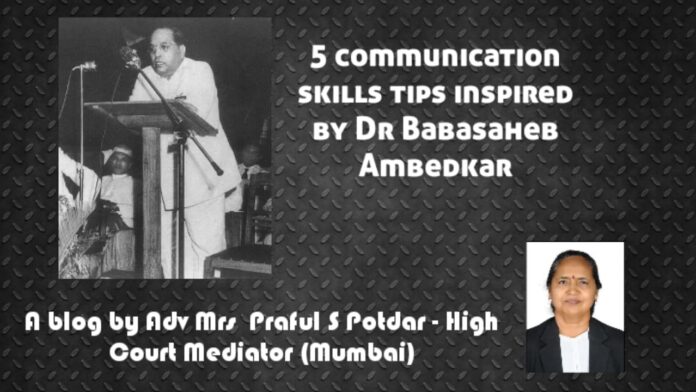Dr. Babasaheb Ambedkar, a towering figure in Indian history, not only led social reform but also exemplified exceptional communication skills that resonate even beyond borders. Let’s explore five communication tips inspired by Dr. Ambedkar, enriched with incidents from his life, along with relevant book references by foreign authors for further understanding.
- Clarity of Message: Dr. Ambedkar’s speech at the Round Table Conference in 1932 showcased his ability to convey complex ideas with clarity. Despite facing skepticism, he articulated the demands of marginalized communities with precision, leaving a lasting impact. This clarity of message can be explored in “The Essential Writings of B.R. Ambedkar,” a compilation offering insights into his compelling rhetoric and advocacy.
- Effective Listening: During the Poona Pact negotiations in 1932, Dr. Ambedkar demonstrated empathetic listening skills. He attentively listened to the concerns of various stakeholders, fostering dialogue and understanding. This incident highlights the importance of active listening, as elaborated in “The Art of Communicating” by Thich Nhat Hanh, which emphasizes the transformative power of mindful listening in communication.
- Adaptability in Communication: Dr. Ambedkar adeptly tailored his communication style to diverse audiences. Whether addressing the masses or intellectuals, he adjusted his language and tone accordingly. This adaptability is evident in his writings, as showcased in “The Autobiography of Malcolm X,” which illustrates the importance of adapting communication to connect with different audiences.
- Negotiation and Persuasion: Dr. Ambedkar’s negotiation skills were pivotal during the drafting of the Indian Constitution. Through strategic persuasion and negotiation, he ensured the inclusion of provisions safeguarding the rights of marginalized communities. Readers can delve into his negotiation strategies further in “Getting to Yes” by Roger Fisher and William Ury, which offers practical insights into principled negotiation.
- Courage in Communication: Dr. Ambedkar exemplified courage in communicating his convictions, even in the face of adversity. During the Mahad Satyagraha in 1927, he fearlessly led a campaign for the rights of untouchables, inspiring others to challenge social injustices. To explore his courage in communication, readers can refer to “Long Walk to Freedom” by Nelson Mandela, which recounts Mandela’s unwavering commitment to justice and equality through effective communication.
By studying Dr. Babasaheb Ambedkar’s communication skills and drawing lessons from his life, we can enhance our own communication abilities and become catalysts for positive change. As we commemorate his legacy, let us emulate his exemplary communication skills and unwavering commitment to social justice.
Book References:
- “The Essential Writings of B.R. Ambedkar” – Compiled writings offering insights into Dr. Ambedkar’s rhetoric and advocacy.
- “The Art of Communicating” by Thich Nhat Hanh – Emphasizes the transformative power of mindful listening in communication.
- “The Autobiography of Malcolm X” – Illustrates the importance of adapting communication to connect with different audiences.
- “Getting to Yes” by Roger Fisher and William Ury – Offers practical insights into principled negotiation.
- “Long Walk to Freedom” by Nelson Mandela – Recounts Mandela’s commitment to justice and equality through effective communication.
















